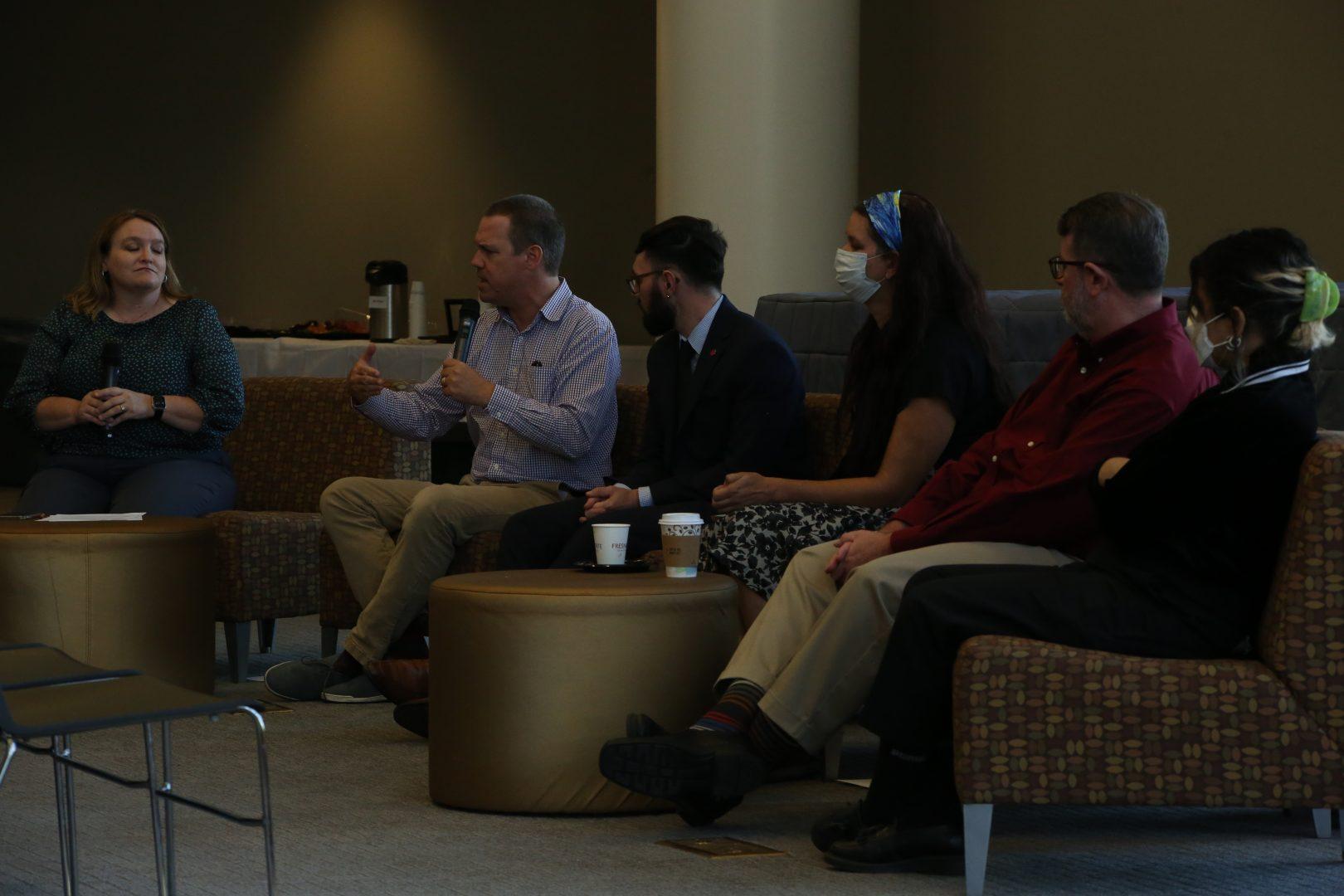Student Success librarian Ginny Barnes programs and organizes many events for the Fresno State Library.
While her job usually targets first year students and undergraduates, when her dean asked for any ideas for a bigger outreach event, Barnes decided she wanted future events to focus on multi-literacy.
“I think that’s a good way to approach all students in the Library because of how different subjects interact with each other and different skills are valuable to any student, any person really. I thought it’d be fun to kind of explore these different [subjects], and civic literacy is one that I think it was good to start [with],” she said.
On Oct. 12, the ibrary hosted a panel discussion on civic literacy called “Taking Civic Action 101.” The discussion brought up various topics including the role of news media, politics and civic engagement within society, and how to utilize those sources to increase students’ civic engagement.
Fresno State students said they appreciated the opportunity to talk to media sources directly and were motivated to do more within the community.
“I think I just appreciated the open dialogue of people who are in the things that we’re kind of learning about in school,” said Gabrielle Nolan, a Fresno State student majoring in Media Communication and Journalism (MCJ).
She said it was interesting learning how to expand her media consumption with different perspectives while questioning what she is consuming with her own opinions as well.
Leslie Penida, another MCJ student with an emphasis on filmmaking, said she didn’t watch or read any media outlets before the panel. She said her biggest takeaway from the event was to start small and focus on topics she finds interesting.
“I think I’m gonna start looking [up] a little bit more of what I like [on social media] and try to make my feed a little bit more informed, because I do live under a rock,” Penida said.
She advised other students to be more aware and check out more media outlets. Penida said the panel showed her that it’s mostly important for other people to figure out where to get their news.
The panel was moderated by Fresno State professor Lisa Bryant.
Panelists included Fresno State MCJ Professor Wes Wise and David Klein, the Associated Students Inc. senator for the College of Health and Wellness.
Other panelists included Josefa Vega, the Central Valley Regional Organizer at the American Civil Liberties Union (ACLU) of North California; Brandi Nuse-Villegas, a community advocate; and Joe Moore, the president of Valley Public Radio.
The panel started with the purpose of media publications, such as news sources and how students should navigate the wide variety of information available.
Moore defined the role of media within his own goals at Valley Public Radio.
“We feel that our role as a public media organization is to create content that’s accessible to everyone. There’s no paywall. We work to be really connected in our communities. That’s what we view our responsibility as,” he said.
Moore also said due to staff shortages in local newspapers and publications, it’s made it harder for people to get their local news. He recommends students in Fresno check out the Fresno Bee and ABC30 for local news.
Wise transitioned to the upcoming General Elections, saying there are significant news deserts throughout the country.
“People who live in these communities don’t have local newspapers [and] they don’t know what’s actually going on. It’s typically word of mouth for things like that,” Wise said.
He said this has led to social media apps like TikTok and Instagram becoming more accessible sources for news because their feeds are targeted to the user. Advertisement also fills that hole for news deserts, Wise added.
Laughter filled the room when Wise jokingly asked the crowd if they’re familiar with Proposition 26 and 27, which involves altering gambling laws in California. Wise said advertisement companies and those who fund for or against things on the voting ballot flood people with ads, so while everyone may have heard about these propositions, they may only know a biased version of them.
Vega said her work in the ACLU has focused on defending press rights within the First Amendment.
“We do our best to inform the public and kind of act as [these] in-between sources that interpret information but [we’re] also ensuring that we’re also doing it in a neutral way, with the acknowledgement of bias violations or potential violations with both civil liberties and civil rights,” she said.
Nuse-Villegas said access to local sources is crucial and offered a free online source for students and Fresno community members.
Central Valley Community Action, found online at bit.ly/CVAction, is a website Nuse-Villegas created. She encouraged attendees to visit the website for local opportunities to get involved in community justice and civic engagement.
“I think you should start thinking about what is going on in your community and the things that you see that are affecting your community. Be educated on those things. I’m a big proponent of looking more deeply at root causes [for social problems] and finding out what the community can do to respond,” Nuse-Villegas said.
Barnes said it was nice to have panelists like Nuse-Villegas, who she worked with previously on voter registration during the pandemic, and to see Fresno State students getting engaged.
“This was a lot of work but I’m really happy with how it turned out,” she said.
The Library will collaborate with the Student Health and Counseling Center (SHCC) for its next event during finals week. More information will be posted later in the fall.




